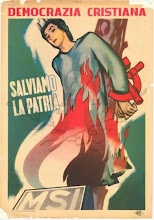 http://www.nytimes.com/2008/11/15/world/middleeast/15bibi.html?partner=permalink&exprod=permalink
http://www.nytimes.com/2008/11/15/world/middleeast/15bibi.html?partner=permalink&exprod=permalinkClick on the Russian-language version of the campaign Web site of Benjamin Netanyahu, the conservative Likud leader running for prime minister of Israel, and up pops a picture of the candidate with Barack Obama. On the Hebrew version, Mr. Obama is not pictured. But he is, in fact, everywhere.
The colors, the fonts, the icons for donating and volunteering, the use of videos, and the social networking Facebook-type options — including Twitter, which hardly exists in Israel — all reflect a conscious effort by the Netanyahu campaign to learn from the Obama success.
“Imitation is the greatest form of flattery,” noted Ron Dermer, one of Mr. Netanyahu’s top campaign advisers. “We’re all in the same business, so we took a close look at a guy who has been the most successful and tried to learn from him. And while we will not use the word ‘change’ in the same way in our campaign, we believe Netanyahu is the real candidate of change for Israel.”
Those who created the Obama Web site, including Thomas Gensemer, managing partner of Blue State Digital, say the Netanyahu site is closer to Mr. Obama’s than any others they have seen.
“Nothing has been so direct as the Netanyahu Web site, though we have seen others with shades of it,” he said, adding that when a campaign is successful, “people are going to knock things off, both in terms of functionality and aesthetic.”
Web sites aside, for liberals in both countries, the idea of Mr. Netanyahu as the Obama candidate of Israel seems mystifying. Of the three main contenders for prime minister in February’s election, including Tzipi Livni of Kadima and Ehud Barak of Labor, Mr. Netanyahu is the most hawkish and the least interested in the focus on dialogue with adversaries that Mr. Obama made a centerpiece of his foreign policy platform. Mr. Netanyahu has said he would shut down the current negotiations with the Palestinian leadership.
But it is precisely the break with the current policy that Mr. Netanyahu, known by his nickname Bibi, believes will help him take the largest share of votes. The most recent polls show him slightly ahead of his rivals.
Sani Sanilevich, who is managing Mr. Netanyahu’s Internet campaign, said the Web is one of the biggest focuses of the campaign, and with good reason.
“The main advantage of the Internet is the ability to communicate with citizens and people directly,” he said. “You can actually hear them and get them involved in this campaign. The whole idea is, together we can succeed.”
That last phrase, “Together we can succeed,” is the campaign slogan on the Netanyahu site, and it does echo, to some extent, Mr. Obama’s “Yes we can.” Mr. Sanilevich said the Netanyahu campaign plans to make use of Twitter, the mass text-messaging service that sends out short “tweets.”
“There are a couple thousand in Israel on Twitter,” he said. “We have lots of people using the Web sites registered as volunteers, and I am sure we will be able to use Twitter, which is an amazing tool. I have it on my phone and I go around with Bibi and everywhere we go he gives me things to say on Twitter.”
Netanyahu aides say direct communication with voters is important for many reasons; one of them is their belief that Israel’s mainstream media are not sympathetic to the candidate, and he needs to go around them.
The campaign said that like the Obama operation it would bombard its supporters with messages for volunteering and donating opportunities and set up a site where supporters could communicate with one another without the campaign’s direct involvement.
At least before Mr. Obama’s victory last week, Mr. Netanyahu might have been expected to have a stronger political rapport with Senator John McCain. The Republican positioned himself as the more reliable friend of Israel. His campaign portrayed Mr. Obama as an uncritical friend of a prominent Palestinian critic of Israeli policies in the West Bank, and also accused him of associating with a terrorist.
But Dore Gold, a former Israeli ambassador to the United Nations and a close Netanyahu adviser, said the Likud leader liked and respected Mr. Obama, so it was not strange that he had taken a page from the president-elect. He said that the two meetings they had held so far, in Washington in 2007 and in Jerusalem last summer, had gone very well.
“I was at both meetings, and it was clear that the two leaders established a very good chemistry very quickly,” Mr. Gold said. “We are convinced that the Obama administration will be open to hearing new ideas from Israel on how to make progress in the region.”
Mr. Netanyahu is positioning himself as the candidate of new ideas both for Israel itself and for peace with the Palestinians.
The ideas revolve around economic opportunities, aides say, cutting red tape to improve the Palestinian economy, building peace from the ground up instead of the top down, and improving life in Israel with a bold domestic agenda involving improved education, economic growth and personal security against increased crime.
The aides are convinced that negotiations with Palestinian leaders will lead nowhere and that while waiting for Palestinian attitudes to change, the best steps Israel can take involve building the Palestinian economy. Ms. Livni, on the other hand, has vowed to continue the negotiations with the Palestinians, which she is helping to lead.
Mr. Netanyahu’s aides add that just as the Obama campaign linked Mr. McCain to President Bush, they plan to label Ms. Livni as continuation of the status quo and Mr. Netanyahu as the candidate of change.
“Yes he can,” one aide said, with a touch of self-parody. “He believes he is the guy who can do it.”
Ethan Bronner reported from Jerusalem, and Noam Cohen from New York.



















